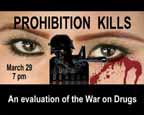“bullet” Drug Sense Weekly (and yes, the feature article is mine)
“bullet”
- DrugWarRant.com, the longest running single-issue blog devoted to drug policy
Join us on Pete's couch.
 Send comments, tips,
Send comments, tips,
and suggestions to: Recent Comments
Servetus on It isn’t about the drugs.: “Pete Hegseth is being blamed for committing three war crimes, including perfidy in the bombing of boats off the coast…” Jan 14, 20:38
Servetus on Marijuana prohibition and the origins of totalitarianism: “CBD treats fetal alcohol disorder in laboratory studies on mice: 14-Jan-2026 – Cannabidiol (CBD) could become a therapeutic tool to…” Jan 14, 20:25
Servetus on Marijuana prohibition and the origins of totalitarianism: “Gene therapy alternative for chronic pain might replace use of opioids: 7-Jan-2026 –Philadelphia—A preclinical study uncovered a new gene therapy…” Jan 11, 10:57
Servetus on Marijuana prohibition and the origins of totalitarianism: “Yoga as an adjunct to chemotherapy can treat opioid withdrawal: 7-Jan-2026 – In this randomized clinical trial, yoga significantly accelerated…” Jan 11, 10:27
Servetus on Marijuana prohibition and the origins of totalitarianism: “Modifications of chemical scaffolds associated with psychedelic compounds can be achieved using ultraviolet light: 7-Jan-2026 — UC Davis researchers have…” Jan 11, 09:46
Paul Revere on It isn’t about the drugs.: “Sure, it’s regime change—now let’s take Iran, Cuba, Colombia, Mexico. All sterling examples of a self-determination for indigenous people. Also,…” Jan 4, 06:14
Servetus on It isn’t about the drugs.: “Colombian fisherman dies in a U.S. boat strike, no evidence of drug smuggling. Hegseth blamed. Family files a formal complaint.…” Dec 29, 16:01
Servetus on It isn’t about the drugs.: “Boat debris in U.S. Caribbean attack on boat by U.S. contained packaging with traces of marijuana, NY Times: Dec 29,…” Dec 29, 15:54
Pages
- About
- Articles
- A Day at the Museum
- A story for Thanksgiving (Isidro and Teresa Aviles)
- Andrea Barthwell, caught red-handed
- Andrea Barthwell, Snake Oil Salesman
- Bong Hits 4 Jesus – Supreme Court Case
- DEA Bad Girl Michele Leonhart
- Deep Thoughts About the Drug War
- Drug War Victims
- Drug War Videos
- Drug WarRant Joins SOPA, PIPA Protest
- Hammer Down, Pop Up
- If I were Contrarian-King of the United States
- Increase in Burger Abuse Seen
- Irvin Rosenfeld and the Compassionate IND — Medical Marijuana Proof and Government Lies
- Karen Tandy and the DEA (Can Congress Get a Clue?)
- Len Bias – the death that ushered in two decades of destruction
- Mother and Son
- Patriot Act, Victory Act, Despot Act
- Petition for Correction under the ONDCP Information Quality Guidelines
- Raich v. Ashcroft
- Rand and American Enterprise Institute Studies – Indictments of Federal Drug Policy
- the Drug Czar is Required by Law to Lie
- Treatment Statistics
- Who’s Who in Drug Prohibition
- Why is Marijuana Illegal?
January 2026 M T W T F S S 1 2 3 4 5 6 7 8 9 10 11 12 13 14 15 16 17 18 19 20 21 22 23 24 25 26 27 28 29 30 31 Archives
Authors
January 2026 M T W T F S S 1 2 3 4 5 6 7 8 9 10 11 12 13 14 15 16 17 18 19 20 21 22 23 24 25 26 27 28 29 30 31

